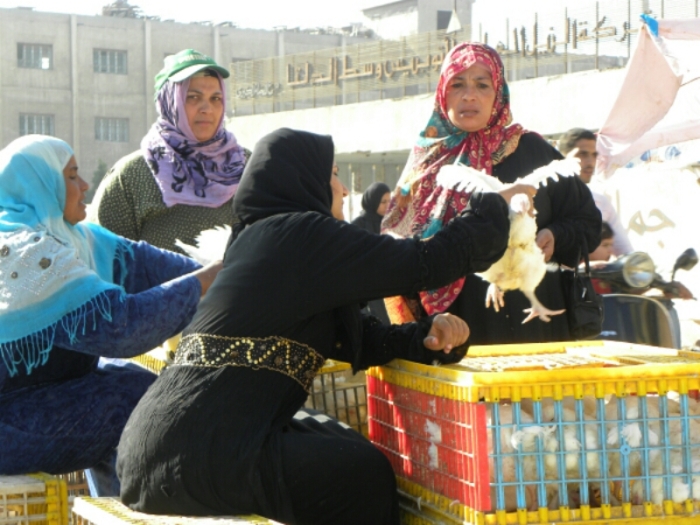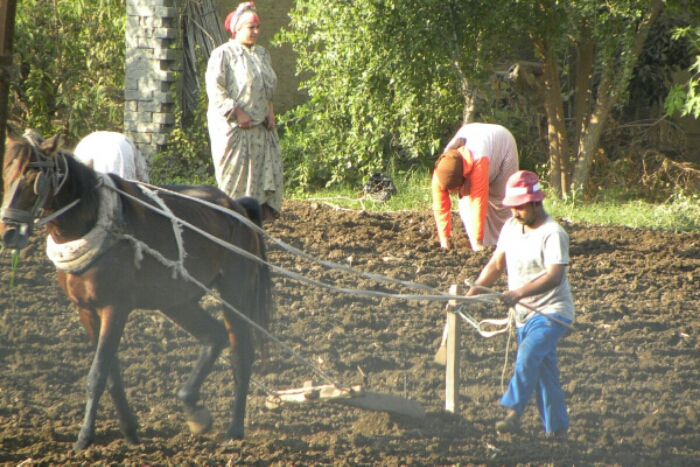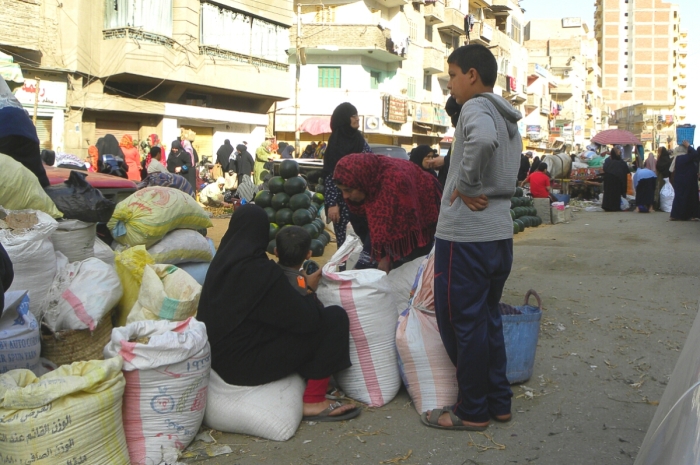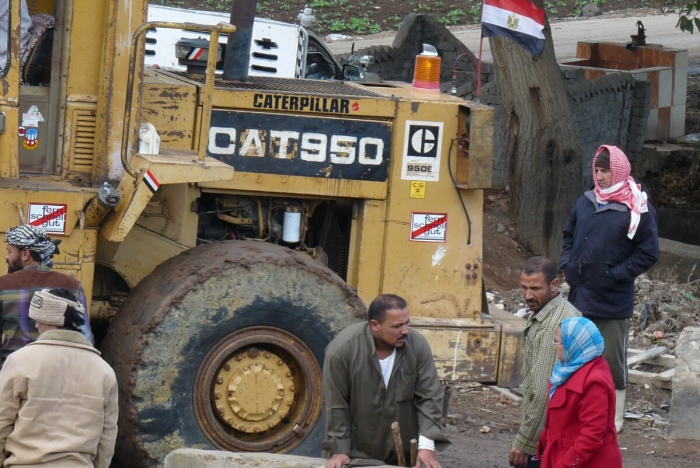In Egypt, “Women are 50% of the community.” This is a famous Arabic saying here, and its popularity is a strong proof of the respect paid to women in this country. In general, Egyptians are a conservative people with strong emphasis on marriage and family. Mothers are heavily relied upon to shoulder the burdens of childbearing and rearing, while fathers are typically the economic providers. Commercialized day care is not an option for most families, being a luxury available in only select locations of a very few major cities. Under these circumstances, it is surprising to learn that approximately one fourth of the paid workforce in Egypt is female. Let’s take a closer look at female employment in Egyptian communities.
.
.
.
Islamic practices play an important role in shaping the work ethic of Egypt, as the majority of the population is Muslim. Regarding employment, it is important to note that Islam places no financial burdens on a woman. The man is solely obligated to provide all of the financial support for his wife and family. However, although she does not have to do so, a woman does have the right to work outside of the home. Furthermore, under Islamic law, she has the right to keep all of her income for herself. Naturally, as in anywhere in the world, a woman in Egypt enjoys more or less of her religious and/or cultural rights as her immediate family circumstances will tolerate. I feel it is quite encouraging to see such a large workforce of women here, in all types of positions from helping out as rural farmhands, to presiding over posh government offices.
As of 2010*, within the female workforce, about 43% of women are employed in agricultural occupations, 23% are employed in professional occupations, and 14% as technicians and professional assistants. Within the government sector alone, approximately 37% of the workforce is female, with women typically filling administrative, clerical and secretarial positions. But these are cold, dry statistics, with limited ability to inspire the imagination. Join us on a trip around my local area while Mohamed and I run some typical errands and we’ll introduce the workers we meet in the process.
On a typical Tuesday, the farmer market in our nearby city is in full swing by 7 in the morning. Stalls and tables and simple blankets laid out on the ground are overflowing with goods and produce lining the left and right sides of the street, as well as the left and right sides of the center line. Everything on earth is likely on sale here, and chances are equally likely that at least 50% of all bargaining will be made with a lady vendor. Need a chicken for dinner tonight? Pick one up here in the market. The lady chicken vendors in the first photo at the top of the page, preside like expert judges over three crates of live chickens, displaying a fine feathered bird to a lady shopping for her dinner.
Paying the electric bill is next, the bill is hand delivered to our door, and must be paid with cash in person at the electric company. Mohamed approaches a counter behind which sit the cashiers, three men and two women. He bypasses them and goes directly to the desk of Madame Office Manager, prefering her expertise after long years of dealing with the problems of maintaining local electric service during long terms of overseas living. Paying a year’s worth of electric service in advance to a cashier could be the luckiest day of a cashier’s life, and it could very easily be a year before learning it never got applied to Mohamed’s account. But Madame Office Manager clearly values her high status position, and never tolerates mistakes or cheating. We sit respectfully in the chairs facing her desk and she directs her employees very admirably with an air of grace and command.
On our way out of the electric building, we pass “Ostaza” Mona, and stop to exchange greetings. She was my personal lawyer a few years back, and assisted me with a legal case related to my Egyptian citizenship. “Ostaz” is a title of respect specifically used for high visibility professional men, teachers, and lawyers, modified to “Ostaza” for the relatively uncommon women in these positions. Mona assures me happily that there are far more women in her field now than there were only a few years back.
Finally, as we arrive back home we find a huge commotion of activity on our humble little corner of Egyptian farmland. It appears the entire Water Department has assembled with their heavy equipment, ready to undertake a new project. The dilapidated water regulating equipment on the bridge is scheduled for a complete overhaul, and everyone is taking orders from Madame “Mohandissa” Fatima. “Mohandissa” means Engineer, in this case the -a on the end of the word signifies the feminine form of the noun. It is a title of great respect, and quite a pleasant surprise to learn that the boss of all this manly commotion is a woman!
With women occupying 50% of the husband-wife relationship, it is great to learn that Egyptian women also command their right to 50% of the community in Egypt. It is clear from the average examples seen in the daily life here, that this is more than a simple platitude that people pay only lip service to. The level of respect, generally speaking, with which I have witnessed women treated in the Egyptian workplace, regardless of economic background, is quite high and it is very inspiring!
;^)
* Data according to The Social Research Center, American University in Cairo
Click Here to return to Egyptian Culture, Part 4: Powder Sugar Mustaches Or Click Here to continue to Egyptian Culture, Part 6: Water, Water, Everywhere




Fantastic post @Aisha, beautiful photos! Thank you so much for share.
LikeLike
You are so very welcome, Della, great to see you! ♥♥♥ ;^)
LikeLike
This was very thoughtful and nicely written. I love the insight into egyptian life, especially for women. I wonder how life changes for women who are widowed or without male family members?
LikeLike
Thanks very much Peggy, I appreciate your encouragement! That’s a really good question, about the widows or those without male family members – since many women are working already, and there is no stigma attached here to working woman, a woman without male family members, generally speaking, has probably found it necessary to work from an early age… or at whatever age she found herself without economic support, at any rate, and that also applies to widows, although in both of these cases there is all over Egypt a strong community practice of giving charity on a monthly basis to the women in these predicaments. I’ll have to do am article on this, it’s a fascinating and deep subject, the practical aspects of the charitable donation system in Egypt, thanks for inspiring me! ♥♥♥ ;^)))
LikeLike
Wonderful post… I was so interesting in reading these facts… and the different ways of living.. I am happy that you know your electric bill has been paid and will be honoured.. how awful to discover one year on your had be duped..
Women around the world play more important roles in keeping their communities going.. 🙂 xx
LikeLike
Thanks very much, Sue, yes, corruption takes many strange forms and hits people in the sneakiest ways! And yes, the role of women in their communities is something to be proud of all over the world! Thanks for visiting me, great to see you! ♥♥♥ ;^)
LikeLike
Wonderful reading and VERY interesting. I remember long ago I had a student from Yemen whom I was tutoring in English grammar. One day I couldn’t find a parking place, so when I passed him where he was waiting for me, I motioned him to get in my car. We drove around two more times and I found a parking place. It was tight, but I managed to parallel park. He said, “My teacher, this is no good. In my country you would not need to drive.” I would, however, still have had the privilege of being his teacher. I have thought of that very often and always when I’m facing a tough parking slot.
LikeLike
Lol, how interesting! I do like the way he put it tho, by saying “you would not need to drive”, as opposed to the other way it might be put, “you wouldnt be allowed to drive”! In many arabian countries the women are not allowed to drive, and it’s quite restricting in psychological terms as well as physical terms. On the other hand, public transportation in these countries is well developed beyond the imagination of most westerners, and cheap enough for even the poorest women to find the transportation she requires to get around wherever she wants or needs to go. In Egypt, women are allowed to drive, and in the cities many do, but the road system is miserable and owning a car is a very expensive headache, especially when the reality of public transportation is so incredibly accessible, it just doesn’t make sense to buy a car when you can always catch a taxi or a tuktuk or a microbus, it’s way, way cheaper than gas! Thanks for the great comment, Martha, great to see you as always! ♥♥♥ ;^)
LikeLike
I’m glad your posts have reappeared in my Reader! Very enjoyable reading.
LikeLike
Thanks for the information especially since I do not know much about Muslim religion. It’s good to know woman are getting out too… Love, Lor
LikeLike
Thanks so much, Lor! I’m very happy to share, for exactly your reason, many people don’t know these things, me too, I was surprised and happy to learn all this too, and it’s so enjoyable for me to write about Egypt! Thanks for reading! ♥♥♥ ;^)
LikeLike
JazakAllah Khair, dear sister, for writing this. It shows that Muslim women are not deprived of rights or their ability to stand on their own two feet.
It is a common misconception that Islamic laws undermine females, but it is the exact opposite. They are created to protect us, such as the law of not having to go out and earn our own living, should we not wish. Take care, sister Aisha.
LikeLike
Wa antum, dear sister, Allah bless you and your family too! Thanks for your great comment, it’s true, Islam gives many rights to women that so many people are unfamiliar with, sadly, but God Willing this is changing little by little. In my lifetime I have seen the average american person go from knowing absolutely nothing about Islam to the point where kids in public high schools today are now learning the fundamentals of Islam as a basic part of social studies! Alhamdulillah, thanks to God! We all make much better citizens of the world when we learn a little bit about people who are different than us. Respect is an excellent glue! Thanks so much for reading and a blessing to see you, sis ♥♥♥ ;^)
LikeLike
this is a wonderful post. I for one though not muslim know that the prophet believed in equality of women though it may be shown in more cultural implications of course. I enjoyed reading this as Egypt is a great example of more progressive and democratic attitudes it seems to me. They have had such a varied history and interaction. There is also a smaller population that is coptic. Do you know how that works in the Egypt of today.?
LikeLike
Thanks for visiting, Cybele, great to see you! Your comment is wonderful, it is wonderful to understand how much the knowledge of Islam is spreading these days among non muslims, it’s very encouraging!
Yes, you are right, Egypt is (despite its political instability) a country where democratic principles tend to guide the general population/culture. My opinion on this is because fairness is a universal principle, and society always operates more sucessfully when fairness is the prevailing principle. Democracy and Islam and Christianity all support fairness and for this reason we all have a great basis for getting along well, if we adhere to the principle.
The Copts, while a minority in Egypt, are a lively part of the society and culture here, and in my experience they are treated with respect, no less than women, or any other group we may define as a minority in Egypt. There are political reasons for exaggerating the differences between any rival political groups in any society, and this plays well in the media, but in fact the Copts are a part of mainstream life here in very visible and well respected ways.
I plan to cover many aspects of daily life in Egypt here in this culture series, including the social relationships of people of different faiths, it’s really fascinating to explore how a society operates!
LikeLike
I will look forward to new posts on this subject. 🙂
LikeLike
Such a revealing post, dear Aisha… women are ot always in a very Good social position, and this tend to happen in the whole world, Even in powerful and rich countries.. The situation in Argentina as Regard to labor conditions are quite similar to the ones you have described for poor women, which is really heartbreaking… I always have the sensation that there are different realities and / or layers involved in the Same Reality. And It is our duty to keep that in mind and try to change It…
Thank you very much for bringing this important topic into the spotlight.
All my very best wishes and hugs to you, Aquileana 🙂
LikeLike
Dear Aquileana, you are so right, and so compassionate, to realize the many different layers of reality in any society, they float along like air currents that almost never mingle, although we breathe the same air every day!
Thanks so much for that great observation, I think the more we take time to understand what the life is like for those around us, especially in circumstances different than our own, it is possible to become better citizens, more helpful to one another, or at least more compassionate to the reasons why the other is different!
Your comment is beautiful, Dearheart, thanks so much for visiting me here, I’m on my way over to visit you right now! ♥♥♥ ;^)
LikeLike
Fascinating, the images are really interesting and documentary, thanks for sharing this information.
LikeLike
So glad to see you here, Maria, thanks! I’m happy to share, and glad you enjoyed it!
LikeLike
Interesting. I love the picture of the women with chickens.
LikeLike
See the lady staring at me?lol, I think she wasnt happy about my taking their picture, and she told the woman buying the chicken about it. They all turned to look at me, I was in our car about 2 meters away from them, and I smiled hugely and said “salamu alaykum!” And they all became so happy, smiling and greeting me, it was great! I’m having lots of fun joining my husband on his trips more often now, and he’s become more helpful when I want him to stop to take photos of things!
LikeLike
All RIGHT! Love to see women taking charge of their lives! Girl power!
LikeLike
Lol, yes, that’s the ticket! ♥♥♥ ;^)
LikeLike
Very interesting and informative post,dear Aisha,immensely intensified by the detailed photos. Your statics (at least in papers … , cold and dry … ) concerning social and cultural issues are also a great source of info for the reader.I also like the fact that you have so extensively refer to women’s role in the Egyptian society as well as the family bonds and relations.To be honest,I am surprised at how things have changed to the better from every point of view as Egypt has so many and complicated political issues to solve.
Also, I was amazed by the details referring to your electricity bill and the unreliable way they treated your payment.It’s really funny …
Well,great read nicely flowing with vivid descriptions and captivating elements society wise.
Sending love ~♥~~♥ and kind thoughts to you , Doda 🙂
LikeLike
Thanks so much, Doda, so happy to see you, and your comments are wonderful! Yes, the political instability is very aggravating, but on the whole it doesn’t affect the daily working lives of most Egyptians. Everyone is pretty good at making do with their situation! So happy you enjoyed the post, Dear! ♥♥♥ ;^)
LikeLike
Your a great writer! MashAllah I hope to hear more about Egypt. This was really interesting! 🙂
LikeLike
Allah bless you my sister, thanks so much for visiting me here, and I’m very happy that you enjoyed this! ♥♥♥ ;^)
LikeLike
Allah bless you as well! ツ your so welcome! awe (;
LikeLike
It sounds like a much more balanced and family-orientated society than the UK. I think that men and women have become very confused about their prospective roles here. If a woman chooses to stay at home rather than pursue a career it is often treated with derision by other women. It is good to hear of a country where there is a choice in this respect and one where the concept of family is not under threat.
LikeLike
What a great comment, thank you very much, Sarah! It’s true, in the US as well, and it’s too bad when women feel pressured by others to behave or to do certain things, especially such critical ones as homemaking and/or employment. Our decisions are personal, and hard enough to gain respect for them, sometimes, in our own homes, and they certainly need to be respected more, especially by other women! Thanks again, I’m very happy to see you, and glad you enjoyed the post!
LikeLike
Salaams Aisha,
Great read! I really enjoyed it. It’s always interesting to learn about different cultures, your post also emphasises the freedom that Islam gives women.
When this freedom is not abused, but rather continuously progressed, it leads to some of the most powerful, hard-working and successful women all around the World! 🙂
LikeLike
Excellent comment, my sister! Yes, you are right, and Allah keep us all on the straight path to His success, in our homes and outside of them as well! Ameen! Thanks so much for visiting, and I’m so happy to see you anytime! ♥♥♥ ;^)
LikeLike
Ameen!
You’re welcome. Aww, thank you. 🙂
LikeLike
Very interesting. It seems they’re doing better in Egypt than here in Australia in many ways, although sadly, I’m not sure that’s saying much.
LikeLike
Thanks so much for visiting me here! I’m so amazed, everytime I look closer at this culture, one of the things that I believe contributes greatly to the success of the female workforce here is free education all the way through university. Of course continuing higher education is dependent on grades, but thankfully not on gender! And the education system is like most countries, more or less successful, depending on the student’s desire to achieve. If he or she wants to be a doctor or engineer, only the grades will stop them, not the cost of the education. I like that alot! Thanks again for reading, I’ll have to come visit you and see how your hen and rabbit are doing! ♥♥♥ ;^)
LikeLike
really enjoyed this – and the photos are just great – and gives us even ore of a feel for the culture e- and how awesome to hear that women have this level of respect – awesome indeed…..
🙂
LikeLike
Thanks so much for visiting me here and reading, Yvette! Yes, I too was quite happily amazed, learning all this as we go about our daily
LikeLike
Lol, hit send but meant to hit return… our daily lives and meet all these really interesting ladies! Honestly this post is just the tip of the iceberg, there are so many wonderful Egyptian women we have met here and their stories would really make you proud of them! ♥♥♥ ;^)
LikeLike
I especially like your first image of the group of women but found all of them most interesting. Thank you for your visit too:)
LikeLike
Thank you for your visit too, so happy to see you, and glad you enjoyed it! ;^)
LikeLike
I visited Egypt in 1996, really I enjoyed a lot, the country is fantastic, its History, El Cairo… all fantastic. It’s the first time I enter in your blog, very interesting. I’m Spanish living in Barcelona Spain.
Regards.
LikeLike
Welcome, Rosa! So happy to meet you, Barcelona is such an awesome city, definitely one of my top favorites in the world. I’m really happy to learn you had a great time in Cairo. Mohamed and I married in Egypt in 1999 and Cairo was awesome then as it is now.
I hope you will enjoy my Joyride to Egypt posts, the first one is at https://aishasoasis.wordpress.com/2013/12/09/my-first-cup-of-tea-in-the-oasis/
And I wrote a poem called, Oh Cairo that you might enjoy since it will remind you of being there! It’s at https://aishasoasis.wordpress.com/2013/12/07/poem-oh-cairo/
Thanks again for joining me here, Rosa! ♥♥♥ ;^)
LikeLike